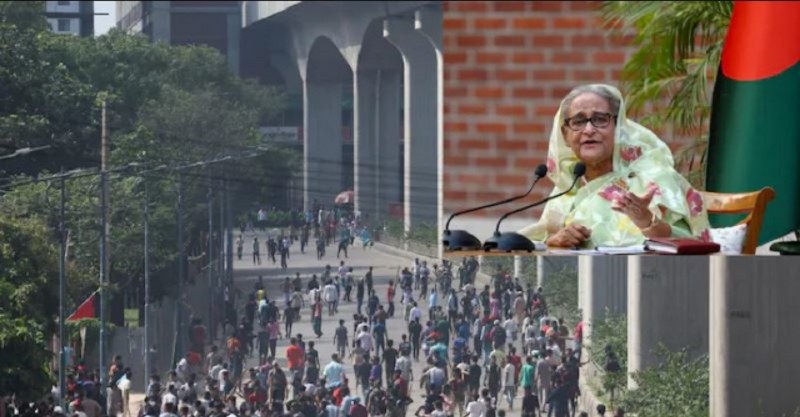
Bangladesh in Crisis: PM Sheikh Hasina quit and Fled amid Massive Protests and Violence. Gen. Waker-Uz-Zaman, the army chief, announced Hasina’s resignation in a televised address. An interim government is expected to be established in the coming weeks. Earlier in the day, thousands of protesters gathered at Hasina’s official residence, demanding her removal. The violence, which has escalated over recent weeks, saw intense clashes between protesters and Hasina’s security forces this past weekend, resulting in dozens of deaths on Sunday.
Bangladesh is currently facing severe turmoil as the Prime Minister Sheikh Hasina fled Dhaka following a surge of nationwide violence. While her exact location remains undisclosed, there are speculations that she might be heading to New Delhi. The situation has escalated quickly, with videos and photos of the unrest going viral on Bangladeshi media.
The crisis began on Monday when protesters stormed the Prime Minister's residence in Dhaka. Reports indicate that the demonstrators broke into Hasina's official palace, overturning furniture, smashing windows, and even carrying off various items, including a live chicken.
Origins of the Protests
The unrest, which started in July, was initially sparked by opposition to a controversial quota system for government jobs. This system had reserved up to 30% of these positions for families of veterans from Bangladesh's 1971 independence war. Students, who make up the majority of the protesters, argued that the system was unfair and disproportionately benefited Hasina’s supporters.
Violence and Government Response
The situation took a violent turn on July 16, with clashes erupting between student protesters, security forces, and pro-government activists. In response, the government deployed tear gas and rubber bullets, imposed a curfew, and cut off internet and mobile data access. Despite the Supreme Court's intervention to reduce the quota, the violence continued.
Rising Death Toll
Over the past weekend, the intensity of the protests increased, with reports of at least 95 deaths on Sunday alone. The overall death toll has now exceeded 300, with nearly 1,500 people injured. The government’s official figures are significantly lower, adding to the controversy surrounding the crisis.
Government and Opposition Stance
Prime Minister Hasina has labeled the protesters as "criminals" and has called for a strict response. She reimposed internet restrictions and offered to negotiate with student leaders, who have so far rejected her overtures. Analysts describe this as a severe test of Hasina’s long-standing rule.
The ruling Awami League party blames the opposition, including the Bangladesh Nationalist Party and the banned Jamaat-e-Islami party, for inciting the violence. However, opposition groups deny these accusations and support the protesters' demands for Hasina's resignation.
Military Involvement
Army chief Waker-Uz-Zaman has suggested that the military might align with the protesters, stating that the army "always stands by the people." This raises the possibility of a temporary military takeover if Hasina is forced to step down. The military’s actions could depend on international reactions and alliances.
Economic and Political Impact
The unrest has also highlighted Bangladesh’s economic struggles, including declining exports and diminishing foreign reserves. The lack of quality job opportunities for young graduates has further fueled dissatisfaction. Critics argue that the protests are a result of Hasina's authoritarian approach and her desire to maintain control.
Uncertain Future
For Sheikh Hasina, the current crisis is a critical moment that could determine her political future. Given Bangladesh’s history of military coups, the outcome of this situation remains uncertain. Even if she manages to overcome the immediate crisis, she faces significant political challenges and potential future protests, according to Michael Kugelman, director of the South Asia Institute at the Wilson Center.
The unfolding events could have long-lasting implications for Bangladesh’s political landscape and its stability.
Latest Updates: